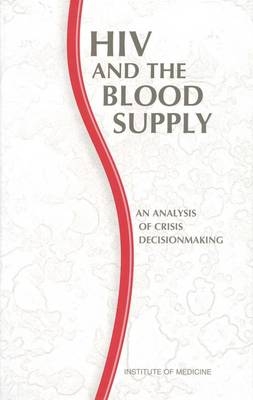
HIV and the Blood Supply
An Analysis of Crisis Decisionmaking
Seiten
1995
National Academies Press (Verlag)
978-0-309-10375-6 (ISBN)
National Academies Press (Verlag)
978-0-309-10375-6 (ISBN)
During the early years of the AIDS epidemic, thousands of Americans became infected with HIV through the nation's blood supply. Because little reliable information existed at the time AIDS first began showing up in hemophiliacs and in others who had received transfusions, experts disagreed about whether blood and blood products could transmit the disease.
During this period of great uncertainty, decision-making regarding the blood supply became increasingly difficult and fraught with risk. This volume provides a balanced inquiry into the blood safety controversy, which involves private sexual practices, personal tragedy for the victims of HIV/AIDS, and public confidence in America's blood services system.
The book focuses on critical decisions as information about the danger to the blood supply emerged. The committee draws conclusions about what was done—and recommends what should be done to produce better outcomes in the face of future threats to blood safety.
The committee frames its analysis around four critical area:
Product treatment—Could effective methods for inactivating HIV in blood have been introduced sooner?
Donor screening and referral—including a review of screening to exlude high-risk individuals.
Regulations and recall of contaminated blood—analyzing decisions by federal agencies and the private sector.
Risk communication—examining whether infections could have been averted by better communication of the risks.
Table of Contents
Front Matter
Executive Summary
1 Introduction
2 The U.S. Blood Supply System
3 History of the Controversy
4 Product Treatment
5 Donor Screening and Deferral
6 Regulations and Recall
7 Risk Communication to Physicians and Patients
8 Conclusions and Recommendations
Appendixes
A Individuals Interviewed by the Committee
B Individuals Providing Oral and Written Testimony
C Chronological Summary of Critical Events, NHF Communications, Knowledge Base, Risk Assessment, Clinical Options, and NHF Actions
D Key Documents Provided to the Committee
E Glossary of Acronyms and Terms
F Committee and Staff Biographies
Index
During this period of great uncertainty, decision-making regarding the blood supply became increasingly difficult and fraught with risk. This volume provides a balanced inquiry into the blood safety controversy, which involves private sexual practices, personal tragedy for the victims of HIV/AIDS, and public confidence in America's blood services system.
The book focuses on critical decisions as information about the danger to the blood supply emerged. The committee draws conclusions about what was done—and recommends what should be done to produce better outcomes in the face of future threats to blood safety.
The committee frames its analysis around four critical area:
Product treatment—Could effective methods for inactivating HIV in blood have been introduced sooner?
Donor screening and referral—including a review of screening to exlude high-risk individuals.
Regulations and recall of contaminated blood—analyzing decisions by federal agencies and the private sector.
Risk communication—examining whether infections could have been averted by better communication of the risks.
Table of Contents
Front Matter
Executive Summary
1 Introduction
2 The U.S. Blood Supply System
3 History of the Controversy
4 Product Treatment
5 Donor Screening and Deferral
6 Regulations and Recall
7 Risk Communication to Physicians and Patients
8 Conclusions and Recommendations
Appendixes
A Individuals Interviewed by the Committee
B Individuals Providing Oral and Written Testimony
C Chronological Summary of Critical Events, NHF Communications, Knowledge Base, Risk Assessment, Clinical Options, and NHF Actions
D Key Documents Provided to the Committee
E Glossary of Acronyms and Terms
F Committee and Staff Biographies
Index
| Erscheint lt. Verlag | 5.11.1995 |
|---|---|
| Verlagsort | Washington |
| Sprache | englisch |
| Maße | 152 x 229 mm |
| Themenwelt | Medizinische Fachgebiete ► Innere Medizin ► Hämatologie |
| Studium ► Querschnittsbereiche ► Infektiologie / Immunologie | |
| ISBN-10 | 0-309-10375-4 / 0309103754 |
| ISBN-13 | 978-0-309-10375-6 / 9780309103756 |
| Zustand | Neuware |
| Haben Sie eine Frage zum Produkt? |
Mehr entdecken
aus dem Bereich
aus dem Bereich
Hämatologie und Internistische Onkologie
Buch | Softcover (2023)
ecomed-Storck GmbH (Verlag)
CHF 179,95
Buch | Softcover (2024)
Urban & Fischer in Elsevier (Verlag)
CHF 73,00


